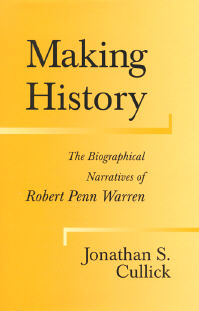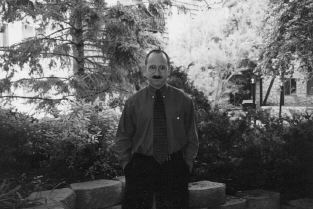New Book - Jonathan Cullick
| RPW Home | Jonathan S. Cullick | LSU Press | Site Map |
|
Making History The Biographical Narratives of Robert Penn Warren Jonathan S. Cullick A newly detected correlation between Warren’s use of the past and his narrative techniques From his first published book to his final works, Robert Penn Warren wrote novels, poetry, biographies, and essays based on the lives of American historical figures—John Brown, Jefferson Davis, Daniel Boone, Huey Long, Thomas Jefferson, Chief Joseph, John James Audubon, Jereboam Beauchamp, and his own father, Robert Franklin Warren, among others. Even some of his critical works take a biographical approach to their subjects, Nathaniel Hawthorne, Herman Melville, John Greenleaf Whittier, and Theodore Dreiser. In Making History, the first comprehensive survey of Warren’s biographical narratives, Jonathan S. Cullick tracks a clear development toward autobiography in Warren’s career. He then applies narrative theory to that provocative trend and makes an intriguing discovery: Warren’s discourse techniques dramatize his philosophy of history and ethics. Cullick unearths what might be called the “narrative syntax” of Warren’s historical vision. Warren’s rejection of the conventional time-line view of history in favor of a “matrix” paradigm that locates all people and time in a web of interconnected action and responsibility is borne out, Cullick demonstrates, in the predominance of biography, especially autobiography, in his canon. For Warren, understanding history requires connecting with the people who lived it, and those two genres, through major shifts in narrative voice and point of view, not only personalize history but restore the narrator’s identity in context to the past. Autobiography—in which the narrator inserts himself into the narrative, giving up his neutral or detached stance—represents the ultimate connection with the historical object of study and, for Warren, becomes the modern alternative to conventional historical discourse. Genre becomes vital in the attempt to reconcile American past and present. Making History considers all of Warren’s major biographical narratives and their evolvement from detached reporting to doubtful self-examination. It offers a new reading of Warren’s famed novel All the King’s Men and close examination of several neglected texts, including Warren’s first book, John Brown: The Making of a Martyr; his essay “The World of Daniel Boone”; and two of his final works, Jefferson Davis Gets His Citizenship Back and Portrait of a Father, both impressionistic collages of genres—history, biography, meditation, portrait, speculation, and autobiography. Jonathan S. Cullick, PH.D. is Assistant Professor; Director of the Writing Instruction Program, Department of Literature and Language, Northern Kentucky University, Highland Heights, Kentucky. For more about Jonathan S. Cullick, PH. D. click here.", |

